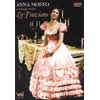Verdi (La) Traviata
A 35-year-old film that remains a faithful rendering of Verdi’s intimate masterpiece
View record and artist detailsRecord and Artist Details
Composer or Director: Giuseppe Verdi
Genre:
DVD
Label: Video Artists International
Magazine Review Date: 6/2003
Media Format: Digital Versatile Disc
Media Runtime: 113
Mastering:
Mono
ADD
Catalogue Number: VAIDVD4223

Tracks:
| Composition | Artist Credit |
|---|---|
| (La) traviata |
Giuseppe Verdi, Composer
Afro Poli, Doctor, Bass Anna Moffo, Violetta, Soprano Arturo La Porta, Baron, Baritone Athos Cesarini, Giuseppe, Tenor Franco Bonisolli, Alfredo Germont, Tenor Gianna Lollini, Annina, Soprano Gino Bechi, Giorgio Germont, Baritone Giuseppe Patanè, Conductor Giuseppe Verdi, Composer Glauco Scarlini, Gastone, Tenor Mafalda Micheluzzi, Flora, Mezzo soprano Maurizio Piacenti, Marquis, Bass Rome Opera Chorus Rome Opera Orchestra |
Author: Alan Blyth
I was pleased to re-acquaint myself with Mario Lanfranchi’s imaginative film of 1968, even though it is lamed by the poor execution of the dubbing and an obviously worn soundtrack (there’s some distortion and overloading). Long before Zeffirelli in his film of the opera opened up the work’s setting, Lanfranchi had done the same without the need to overload the original with filmic effects. The handsome settings here unobtrusively suggest Violetta’s lived-in home (in the last act denuded of all its finery through her reduced circumstances), the country retreat and Flora’s ebullient party, always with a feeling for the milieu. Lanfranchi is ingenious in hiscamera-work, opening up the work in the public scenes, concentrating on close-ups elsewhere.
In a perfectly valid, traditional way, Anna Moffo creates a portrait of a fragile, vulnerable, warm-hearted Violetta, and sings – except at the top of her register – with a fine feeling for Verdian line and for expressive nuance. By today’s producers’ way of dealing with her mortal illness on stage, she looks far too healthy and well made-up at her death, yet manages to make her demise as moving as it should be.
This DVD, as compared with other versions, benefits hugely by having an all-Italian cast. Bonisolli, whom I saw and admired a year later as Alfredo with Scottish Opera, acts stiffly, but sings with a fine line, burnished tone and refined phrasing. Gino Bechi, in his mid-fifties at the time, looks exactly right for father Germont. His tone may have dried out, but it remains firm and reasonably flexible, and he has the right style in his well-routined performance. In the cameo role of the doctor, the 67-year-old Afro Poli – once a leading baritone in Italy – gives an object-lesson in placing words on tone.
Giuseppe Patanè conducts the Rome forces with a forward-moving pulse that makes the conductors listed above seem a shade lethargic, but there is sensitivity, too, in his approach. All the traditional cuts are made, so if you want more of the score, you will prefer one of the other sets (the Solti is absolutely complete). This one most resembles the Hall/Haitink/Glyndebourne version in its intimate, realistic approach; that has Marie McLaughlin as moving a Violetta as Moffo. But, pushed to a choice in modern sound, I would opt for the version from Busseto conducted by Domingo and directed by Zeffirelli with an excellent all-round cast. On a grander scale, the Covent Garden set with Gheorghiu under Solti remains impressive. This work can embrace any number of interpretations.
In a perfectly valid, traditional way, Anna Moffo creates a portrait of a fragile, vulnerable, warm-hearted Violetta, and sings – except at the top of her register – with a fine feeling for Verdian line and for expressive nuance. By today’s producers’ way of dealing with her mortal illness on stage, she looks far too healthy and well made-up at her death, yet manages to make her demise as moving as it should be.
This DVD, as compared with other versions, benefits hugely by having an all-Italian cast. Bonisolli, whom I saw and admired a year later as Alfredo with Scottish Opera, acts stiffly, but sings with a fine line, burnished tone and refined phrasing. Gino Bechi, in his mid-fifties at the time, looks exactly right for father Germont. His tone may have dried out, but it remains firm and reasonably flexible, and he has the right style in his well-routined performance. In the cameo role of the doctor, the 67-year-old Afro Poli – once a leading baritone in Italy – gives an object-lesson in placing words on tone.
Giuseppe Patanè conducts the Rome forces with a forward-moving pulse that makes the conductors listed above seem a shade lethargic, but there is sensitivity, too, in his approach. All the traditional cuts are made, so if you want more of the score, you will prefer one of the other sets (the Solti is absolutely complete). This one most resembles the Hall/Haitink/Glyndebourne version in its intimate, realistic approach; that has Marie McLaughlin as moving a Violetta as Moffo. But, pushed to a choice in modern sound, I would opt for the version from Busseto conducted by Domingo and directed by Zeffirelli with an excellent all-round cast. On a grander scale, the Covent Garden set with Gheorghiu under Solti remains impressive. This work can embrace any number of interpretations.
Discover the world's largest classical music catalogue with Presto Music.

Gramophone Digital Club
- Digital Edition
- Digital Archive
- Reviews Database
- Full website access
From £8.75 / month
Subscribe
Gramophone Full Club
- Print Edition
- Digital Edition
- Digital Archive
- Reviews Database
- Full website access
From £11.00 / month
Subscribe
If you are a library, university or other organisation that would be interested in an institutional subscription to Gramophone please click here for further information.




